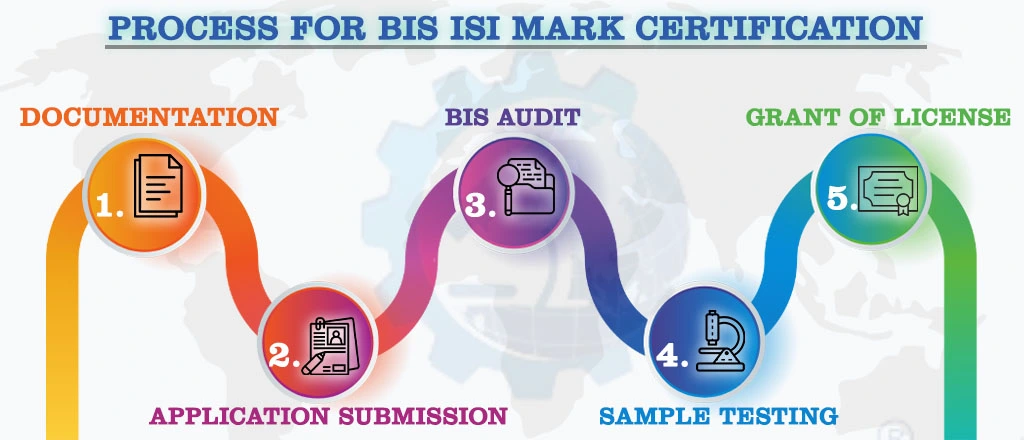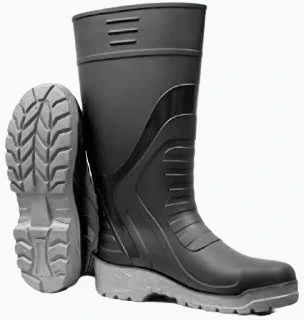BIS CERTIFICATION FOR INDUSTRIAL AND PROTECTIVE RUBBER KNEE AND ANKLE BOOTS
IS 5557:2004
In this competitive scenario, it isn't easy to survive in the market without a standard quality and certified product. BIS license may also be required to sell products in the Indian market.
To get BIS certification and produce a standard quality product, the manufacturer must ensure that their product must follow the specified Indian standard.
Let's take a closer look at IS 5557:2004 for industrial and protective rubber knee and ankle boots.
Industrial and protective rubber knee and ankle boots are covered under IS 5557:2004. This standard specifies the requirements, sampling methods, and testing procedures for industrial and protective rubber boots reinforced with protective steel toe caps for use in mines and heavy metal industries and where the floor is covered with water, chemicals, oil, grease, waxes, lubricants, and so on. This standard does not apply to boots designed to protect against electrical shocks.
According to IS 5557:2004, protective rubber boots are classified into three types. This standard applies to the following three types of industrial protective rubber boots listed below:
| Variety | Classification |
|---|---|
| 1 | Industrial protective rubber knee boots |
| 2 | Industrial protective rubber half knee boots |
| 3 | Industrial protective rubber ankle boots |
Each variety is divided into two types:
- Type 1 - Non-oil resistant
- Type 2 - Oil resistant
The boots must be made of rubber and fabric lined. The boots' rubber components must be nonporous and homogeneous, and these must meet the physical requirements specified in IS 5557:2004. The minimum thickness of Type 1 and Type 2 boots for the various parts and components must meet the requirements specified in the standard. Boots must be made using either the vulcanized or moulded process or both.
Tests
The following test shall be carried out for industrial and protective rubber knee and ankle boots.
- Size, Thickness Test
- Composite Strength
- Leakage Resistance
- Consolidation Test
- Performance Test
- Height Of Boots
- Tensile Test
- Performance Test
A laboratory shall be adequately maintained, in which the various tests shall be carried out according to the methods specified in the standard.
All markings shall be applied to the insole/leg lining fabric with the information prescribed in accordance with Indian standard. The boots may also be marked with the ISI certification mark, and packaging and marking must be done in accordance with the standards. The Manufacturer must obtain a BIS license from the Bureau of Indian Standards to use a standard mark (ISI Mark). The BIS grants a license based on a successful assessment of manufacturing infrastructure, quality control and testing capabilities, and production process.

NOTE:
For Detailed Information about the Procedure for BIS ISI Certification
Visit :
ISI Mark Certification for Domestic ManufacturersISI Mark Certification for Foreign Manufacturers
Conclusion:
If a product falls under the scope of the BIS Conformity Assessment Scheme, All the manufacturers, importers, and foreign entities must obtain BIS ISI Certification. The Bureau may cancel the License if the product fails to meet certification requirements.
Aleph INDIA has been serving the industry as a single-window operator for all product regulatory compliance. We can assist importers or manufacturers in meeting all criteria for importing or selling a product in the Indian market.
International Audits & Participation
Testimonials
BIS REGISTRATION FOR ELECTRONIC & IT PRODUCT
In the era of globalization, world trade is growing rapidly and henceforth, Manufacturing and Import/Export businesses are also growing drastically...View More
BIS CERTIFICATE FOR FOREIGN MANUFACTURER
The Economy of India-the fastest developing economy on the globe with the capabilities that help it matches up with the biggest international...View More
PRODUCT CERTIFICATION SCHEME (ISI MARK) FOR DOMESTIC MANUFACTURERS
Anything a person buys from food to cars, clothes to electronics, branded to unnamed products there is always a question that wanders in one’s...View More
WIRELESS PLANNING AND COORDINATION (WPC)
WPC: Wireless means communication done from one point to another point without the wires and cables. Electromagnetic waves carry the ...View More
BUREAU OF ENERGY EFFICIENCY (BEE) CERTIFICATE
BEE CERTIFICATE: Energy is the future, and its conservation is the way of the bright future. Everyone claims the environment is important...View More
E-WASTE MANAGEMENT
E-waste is one of the world's fastest-growing trash streams. We currently manufacture almost 50 million tones of it each year...View More
Request a call back.
Would you like to speak to one of our Senior Technical advisers over the phone? Just submit your details and we’ll be in touch shortly. You can also email us if you would prefer.
BIS REGISTRATION FOR ELECTRONIC & IT PRODUCT
In the era of globalization, world trade is growing rapidly and henceforth, Manufacturing and Import/Export businesses are also growing drastically...View More
BIS CERTIFICATE FOR FOREIGN MANUFACTURER
The Economy of India-the fastest developing economy on the globe with the capabilities that help it matches up with the biggest international...View More
PRODUCT CERTIFICATION SCHEME (ISI MARK) FOR DOMESTIC MANUFACTURERS
Anything a person buys from food to cars, clothes to electronics, branded to unnamed products there is always a question that wanders in one’s...View More
WIRELESS PLANNING AND COORDINATION (WPC)
WPC: Wireless means communication done from one point to another point without the wires and cables. Electromagnetic waves carry the ...View More
BUREAU OF ENERGY EFFICIENCY (BEE) CERTIFICATE
BEE CERTIFICATE: Energy is the future, and its conservation is the way of the bright future. Everyone claims the environment is important...View More
E-WASTE MANAGEMENT
E-waste is one of the world's fastest-growing trash streams. We currently manufacture almost 50 million tones of it each year...View More
View All Services
Request a call back.
Would you like to speak to one of our Senior Technical advisers over the phone? Just submit your details and we’ll be in touch shortly. You can also email us if you would prefer.






























